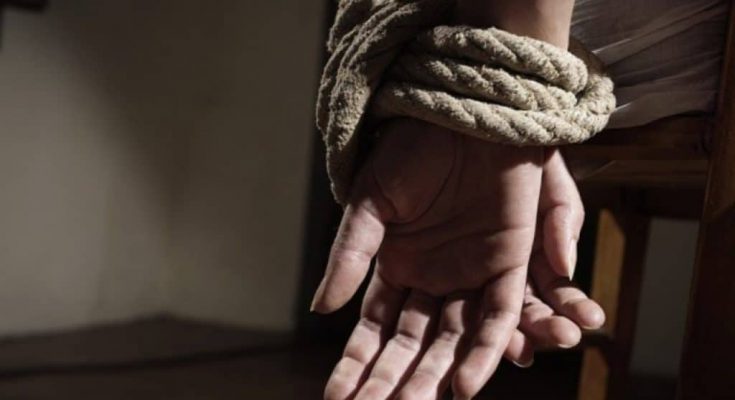

A 23-year-old Nigerian lady simply identified as Bose has narrated her ordeal in Libya.
The Ogun State-born woman says she was chained for 10 days with a piece of cloth stuffed in her throat after she refused to go into prostitution to pay off her agent.
Bose was one of the 159 stranded Nigerians who recently returned from Libya courtesy of the National Emergency Management Agency.
Nationnewslead reports that she spoke with difficulty as she was still writhing in excruciating pains from her broken leg.
She said: “After completing my apprenticeship in nursing here in Nigeria, I got an opportunity to work overseas as a trainee for six months. I was not the only one involved. I got excited and jumped on the opportunity. I went with my certificate with the hope of getting a job after the training, unknown to all of us that we were being taken to Libya for prostitution and human trafficking.
“The picture of what we would face yonder started in the one month journey in the desert. When we arrived there, I was shocked that all they told us about getting jobs and training were lies.
“Rather, I was sold to a Nigerian family. This was a routine for everyone who was taken there with the promise of getting a job. To my greatest surprise, the human trafficking business was mostly done by Nigerians who have stayed longer there. That is one major way of making money. They sell us to families in need of our services, especially for prostitution, so we can be used to make money for them.
“On getting to the Nigerian family I was sold to, I was chained with wire and a cloth was put in my throat, with tape covering my mouth. They told me I would remain there if I refused to go into prostitution, that it was the only job they could offer me.
“I rejected the offer and I was kept in a room for about a week and three days. The wife of the man later directed that I should be untied and sold away.
“When I got to the second family, I was taken to a place called ‘connection house’ for prostitution. In the connection house, both boys and girls were kept there for prostitution. That is also a place where human beings are sold as in the days of the slave trade.
“I was lucky to get a telephone call from a man there, with which I contacted my family. That was how I managed to escape to Nigeria’s embassy.
“But other girls are still trapped there. Some died of diseases while a lot of them are living with different types of venereal diseases because of the different types of men who came to have them against their volition.
“Some of these men would not take their bath for days. Some of them who looked sickly would not use condoms.”
Other returnees who shared their experiences with the newspaper said they were deceived by their travel agent who never told them their destination was Libya.
One Mrs Olaitan, who hails from Oyo State, said: “My journey to Libya started when I got the news that I could get a good job overseas. I left my job at Ikeja, Lagos to embark on the journey for a better life.
“I left Lagos in 2018, with some other people who were also deceived. The agents said some of us were going to Germany and others, Italy. We were excited as we prepared for the journey. We were told that the process would start when we got to Kano state.
“The journey to greener pastures took us about a month. Some of us were stranded and ran out of cash. We passed so many terrorist camps before we got to Libya. We stayed without food for days until we eventually reached Libya.
“What we saw in Libya wasn’t what we were told. Rather, we were told that the available jobs were prostitution and house-help. By then, going back home was difficult. We were used as slaves, with no time to rest.
“We worked as maids and were paid between N50,000 and N70,000, depending on the agreement with the family we worked for. But prostitution was the best chance of survival. Those who worked in the hospital also had their fair share of the hellish condition.
“I paid up to N2 million to settle with my agent. Many others went into prostitution because that was the fastest way they could pay their agents.” Continue Reading








